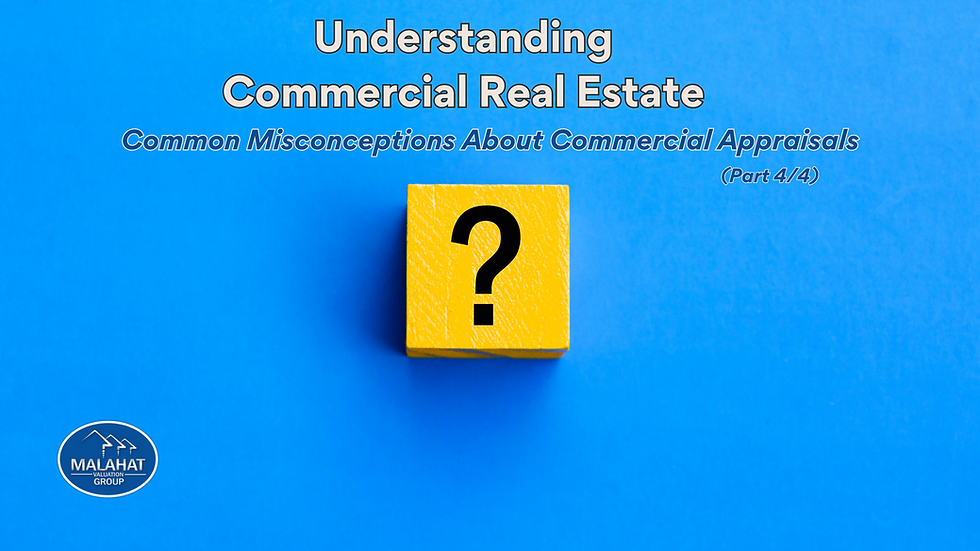Understanding Commercial Real Estate (Part 4/4) - Common Misconceptions About Commercial Appraisals
- Ernest Bednarz
- Aug 13, 2024
- 3 min read

Commercial real estate (CRE) is a cornerstone of economic activity and a major investment vehicle, offering opportunities for income generation, capital appreciation, and portfolio diversification. However, the world of commercial real estate is complex, with numerous factors influencing property values, market dynamics, and investment strategies. Whether you're a seasoned investor, a business owner, or simply curious about the industry, gaining a thorough understanding of CRE is essential.
In this four-part blog series, "Understanding Commercial Real Estate," we aim to demystify the key aspects of this dynamic sector. We'll start with the basics, covering the fundamental concepts and types of commercial properties. From there, we'll delve into the appraisal process, exploring how properties are valued and the critical role appraisers play. Next, we'll examine the market trends that shape the commercial real estate landscape, providing insights into how these trends impact property values and investment opportunities. Finally, we'll address common misconceptions about commercial appraisals, clarifying misunderstandings and offering a clearer picture of the appraisal process.
By the end of this series, you'll have a comprehensive understanding of commercial real estate, from the basics to the intricacies of appraisals and market dynamics. Whether you're looking to invest, sell, buy, or simply expand your knowledge, this series will equip you with the insights needed to navigate the commercial real estate landscape effectively.
Part 4: Common Misconceptions About Commercial Appraisals
Introduction
Commercial real estate appraisals are essential for informed decision-making in the industry, but they are often misunderstood. In this final part of our series, we’ll address some common misconceptions about commercial appraisals to provide clarity and dispel myths.
Misconception 1: An Appraisal is the Same as a Home Inspection
Reality: An appraisal estimates a property's market value, while a home inspection assesses its physical condition. Appraisers evaluate factors like location, market trends, and income potential, whereas inspectors focus on structural integrity, systems, and safety.
Misconception 2: Appraisers Set the Property Value
Reality: Appraisers do not set the value of a property; they provide an unbiased opinion of its market value based on data and analysis. The market ultimately determines the property's value through buyer and seller interactions.
Misconception 3: All Appraisals are the Same
Reality: Commercial appraisals vary based on the property's type, location, and intended use. Different valuation methods (sales comparison, income capitalization, cost approach) are used depending on the specific characteristics and purpose of the appraisal.
Misconception 4: The Higher the Appraisal, the Better
Reality: A higher appraisal isn't always beneficial. For buyers, an inflated appraisal could lead to overpaying for a property. For sellers, it may result in unrealistic pricing that deters potential buyers. Accurate appraisals ensure fair market transactions.
Misconception 5: Appraisals are Always Accurate
Reality: While appraisers strive for accuracy, appraisals are estimates based on available data and current market conditions. Changes in the market or unforeseen property issues can impact the actual sale price.
Misconception 6: Appraisals Can Be Done Quickly
Reality: Commercial appraisals require thorough research, property inspection, market analysis, and report preparation. The process can take several weeks, depending on the property's complexity and the availability of data.
Misconception 7: An Appraisal is Only Necessary for Buying or Selling
Reality: Appraisals are used for various purposes, including refinancing, tax assessments, estate planning, insurance, and dispute resolution. They provide valuable information for multiple financial and legal contexts.
Misconception 8: The Most Recent Sale Price Determines the Appraisal Value
Reality: While the most recent sale price is a factor, it is not the sole determinant. Appraisers consider a range of data, including comparable sales, market trends, and property-specific factors, to arrive at a comprehensive value estimate.
Misconception 9: Anyone Can Perform a Commercial Appraisal
Reality: Commercial appraisals require a licensed or certified appraiser with specialized training and experience in valuing commercial properties. Appraisers must adhere to professional standards and ethics to ensure credible and reliable valuations.
Misconception 10: Appraisals are Not Necessary in a Hot Market
Reality: Even in a hot market, appraisals are crucial for ensuring fair pricing and informed decision-making. They help prevent overpaying in competitive situations and provide a reality check on market exuberance.
Conclusion
Understanding the realities of commercial appraisals helps demystify the process and underscores its importance in the real estate industry. Accurate, unbiased appraisals are essential for fair transactions and sound investment decisions. By dispelling these common misconceptions, we hope to enhance your knowledge and confidence in navigating the commercial real estate market.
Malahat Valuation Group specializes in business valuation and real estate appraisals to owners of privately owned companies and their professional advisors.
When owners need to leverage, sell or reorganize their assets, we answer the age-old question "What is it worth?".
We provide our clients and their advisors peace of mind by preparing professional valuations that stand up to scrutiny from lenders, the Courts, and the Canada Revenue Agency.
Malahat Valuation Group Inc.
(250) 929-2929











Thanks for the extensive article describing the real estate. From Team HardMoneyLoanLender- Get in touch if in need of DSCR Loan Florida and other types of Hard Money Loans, Fix and Flip Loans, Bridge Financing or Ground-Up Construction Loans. We serve Nationwide.